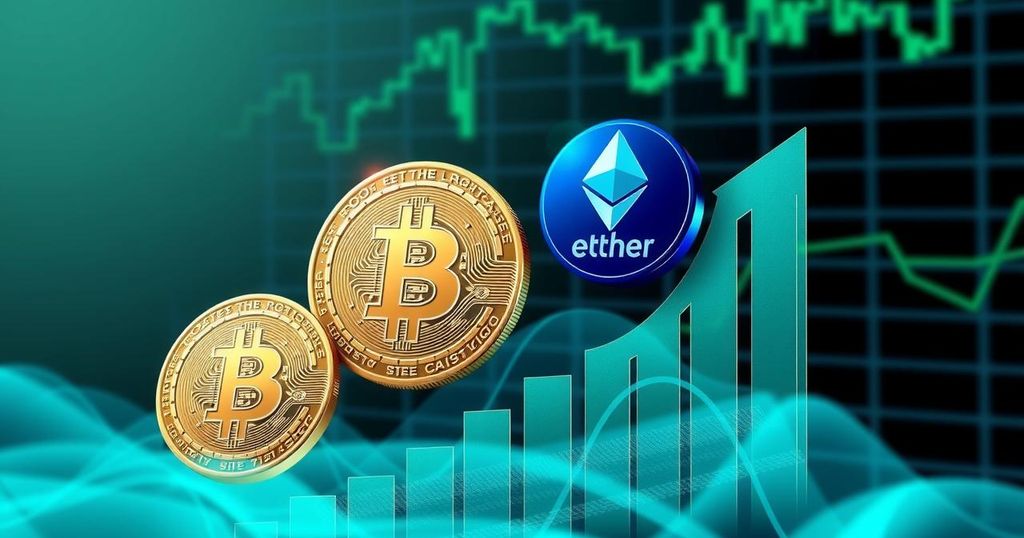Bitcoin, ETH Prices Coiling After Cooling Inflation and US-China Tariff Rollbacks
The crypto market reacted positively to the CPI report, with Bitcoin nearing $109K and Ether gaining. The easing of US-China tariffs didn’t significantly sway stock markets. Concerns linger over rising US debt and interest rates, prompting investors to reconsider their strategies and seek liquidity in cryptocurrencies.
The cryptocurrency market is showing signs of resilience, reacting positively to the recent Consumer Price Index (CPI) report, which indicated lower inflation rates. Bitcoin (BTC) surged toward $109,000 while Ether (ETH) notched up a 3% gain, trading above $2,800. This comes amid diminishing fears of escalating trade tensions between the US and China, despite looming concerns about the US debt ceiling. Meanwhile, traditional assets seem less enthusiastic— the S&P 500 index pulled back after initial gains sparked by President Trump’s announcement of a new trade agreement with China.
Under the newly reached agreement, both the US and China agreed to roll back tariffs to levels last seen in February 2025. This step is seen as a de-escalation of the trade war, which would typically cheer investors and ease fears of economic fallout. However, even as risks associated with the trade fracas seem to fade, the stock market reacted with caution, indicating that many remain underwhelmed by these developments.
On the inflation front, a reported annual rate of 2.4% gives some breathing room for investors who have been anxious about soaring prices amid ongoing trade struggles. Though such news tends to buoy confidence in the stock markets and strengthen the US dollar, trepidation over the ballooning US government debt casts a shadow of uncertainty.
As a result, the US Dollar Index (DXY) fell to its lowest in seven weeks, signaling that some investors are diversifying away from the dollar. This downturn often reflects doubts in the Federal Reserve’s ability to navigate mounting economic challenges, further exacerbating fears around the nation’s financial future. In the meantime, market players seem to be reallocating funds toward other major currencies, looking for stability.
JPMorgan Chase CEO Jamie Dimon raised eyebrows on Tuesday when he flagged concerns about private credit as a potential risk if the economy stalls. He suggests that the US may be vulnerable to a recession, noting that employment will likely face downward pressure and inflation still hasn’t eased as much as desired. This cautious outlook resonates with economists like Joe Brusuelas from RSM, who mentioned a lack of economic growth despite easing tariffs.
The markets currently reflect a significant shift in expectations regarding the US Federal Reserve’s interest rates. The CME FedWatch tool now shows a 73% chance of rates hitting 3.75% or higher by December, a jump from just over 42% a month ago. Higher interest rates tend to burden the economy by making it pricier for individuals and governments to borrow. Such a scenario usually pushes investors toward safer fixed-income assets, as they become more appealing against riskier options like stocks and cryptocurrencies.
Interestingly, signs of decoupling from traditional markets have emerged. While the economic outlook remains cloudy, many crypto traders are betting on a liquidity boost from central banks if the government raises the debt ceiling. As a result, they view cryptocurrencies favorably in this shifting landscape, citing a potential influx of capital into the market.
In summary, the recent CPI report and easing US-China tariffs have lent some strength to the cryptocurrency market, with Bitcoin approaching $109,000 and Ether gaining momentum. Traditional markets, however, are still grappling with investor skepticism. While inflation concerns fade and investors look at alternatives, the specter of rising interest rates remains. As the government contemplates increasing the debt ceiling, crypto assets might just find some comforting liquidity to ride out economic uncertainties.
Original Source: cointelegraph.com




Post Comment